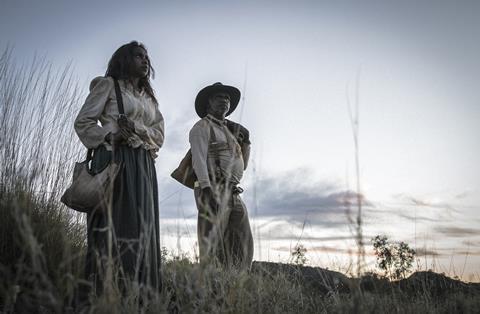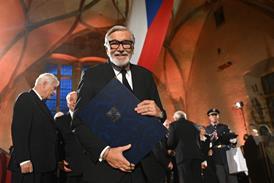From the Middle East to New Zealand, the Asia Pacific Screen Awards span 70 countries and areas across half the planet. Now in their 12th year, the awards continue to play a vital role bringing worldwide attention to a diverse range of filmmakers.

Last year, when Australian director Warwick Thornton went on stage to pick up the best film award for his racial-divide drama Sweet Country, he praised the Asia Pacific Screen Awards (APSA) for being “about a really unique diversity of culture”.
Celebrating cultural diversity is indeed a key objective of the Brisbane-based APSA, which was founded under the auspices of UNESCO. Chairman of APSA Michael Hawkins says: “One of the many great things that APSA is always proud of is its extensive reach. Nominees, winners and jurors cover all parts of the Asia Pacific region, all 70 countries and areas that make half of the world’s film.”
APSA founding chairman Des Power once said that the creation of the awards was a response to what the filmmakers of Asia Pacific lacked — a prestigious award of their own for their work and cultures. Before APSA came into existence, Asia Pacific — a diverse region that produces more than 2,000 feature films a year — had no awards scheme that it could genuinely call its own.
In 2005, Power presented the fledgling concept of APSA to UNESCO’s Asia Pacific committee, which coincided with the historic signing of the UNESCO treaty on the Protection and Promotion of the Diversity of Cultural Expressions. Subsequently, APSA was formally endorsed by UNESCO.
Now into its 12th year, APSA continues to be an international cultural programme supported by the Brisbane City Council and managed by its economic development board Brisbane Marketing.
APSA is a year-round process of research and film viewings, with panels of filmmakers, writers and academics viewing titles throughout the year and recommending for consideration in the awards. Through research or working with APSA’s official submitting national organisations (such as New Zealand Film Commission and Taiwan Film Institute), the competition team will ensure films from both emerging and established industries are considered for nominations.
In 2017, APSA had its first ever nominee from Bhutan (Honeygiver Among The Dogs) and Georgia’s first wins with Scary Mother and Dede. This year, the awards will have its first film from Tonga competing.
Creating greater awareness
Given the reality that the region continues to have its unfortunate share of humanitarian crises, APSA presents a special UNESCO cultural diversity award to create awareness for such issues. Award winners are invited to UNESCO headquarters in Paris to screen their films and bring their message to the world — be it about a musical dream from Palestine (The Idol), the conflict of the Yazidi people in Iraq (The Dark Wind), or a woman’s right to choose who she loves in the traditional Ushguli community of Georgia (Dede).
UNESCO aside, APSA spreads its global reputation through a FIAPF award, a special prize from the International Federation of Film Producers Associations for an outstanding filmmaker. Last year’s recipient was Filipino producer Bianca Balbuena, whose recent credits include Berlinale 2016 Silver Bear winner A Lullaby To The Sorrowful Mystery and 2018’s Season Of The Devil, both directed by Lav Diaz.
APSA reaches another milestone this year with the introduction of a new music award along with a new music jury. “From Bollywood to orchestral scores, this new category will allow us to honour more great films and the musicians who contribute so strongly to the emotions of the films,” says Hawkins.
An international nominations council meets in Brisbane each September, watching more than 120 films to determine five nominees in each of seven feature narrative categories. These include best feature film, best director, best cinematography, best screenplay, best actress and best actor, as well as the cultural diversity award.
Kim Hong-joon, former commissioner of the Korean Film Council, returns to chair the international nominations council for the 12th time, making him one of the longest serving members of APSA.
Internally, Kim and his six fellow council members - including International Film Festival of Kerala artistic director Bina Paul and award-winning Kazakh author, film critic and film researcher Gulnara Abikeyeva - will debate and deliberate on the merits of each submitted work and find a consensus for the nominees. “Given the complexity of the selection, this is a lengthy and exhaustive process,” says Kim. When a unanimous decision is not reached, the council votes in a secret ballot with independent arbiter PwC in attendance.
The NETPAC members from within the international nominations council will determine the APSA young cinema award, which was introduced in 2016 to recognise emerging talents in partnerships with NETPAC and Brisbane-based Griffith Film School.
After the nominations are officially announced on October 17, the baton will be passed on to an international jury, which will visit Brisbane in November and watch every nominated film in the feature narrative categories. Previous high-profile international jury presidents have included Lord David Puttnam (2016), Kim Dong-ho (2015), Asghar Farhadi (2014) and Nansun Shi (2011).
This year, APSA has formed a new alliance with the Platino Awards — the Ibero-American version of the Oscars — following a similar partnership with the European Film Academy in 2011. A member from each of these organisations will sit on the international jury panel.
A separate jury is responsible for a further three awards from the youth, animation and documentary categories. “Much like a film festival jury, the rotating assortment of names chosen means no patterns, biases or favouritism occurs. It comes back to that idea of integrity. We’re nothing without it,” says Hawkins.
A night of celebration will be held on November 29 with the presentation of 14 awards at the Brisbane Convention and Exhibition Centre in Australia.
APSA contact details: apsa@brisbanemarketing.com.au
Success stories
APSA plays a vital role in supporting the region’s cinema at development stage — support that is now bearing fruit.
This year saw five Motion Picture Association (MPA) APSA Academy Film Fund projects premiere at top festivals, including Lee Chang-dong’s Burning in Cannes Competition, with Sergey Dvortsevoy’s Ayka winning best actress for Samal Yeslyamova. Garin Nugroho’s Memories Of My Body premiered in Venice’s Horizons, while Emir Baigazin’s The River won best director in Horizons.
The film fund assists in the development of new feature film at script stage, and awards four annual grants of $25,000 each exclusively to APSA Academy members. Since 2010, it has given out almost $800,000 to 32 projects from 20 different countries and areas. The next round for four new recipients will be announced during the November 29 awards ceremony.
Asia Pacific Screen Lab (APSL) is a year-long development incubator and mentoring programme for emerging filmmakers who have made at least one feature film and are now ready for larger global collaborations.
APSL 2017 project A Land Imagined by Singapore filmmaker Yeo Siew Hua recently won multiple prizes at Locarno, including the top Golden Leopard award. “The APSL has benefited my project immensely through three sessions over one year. The mentors and the programme were catered to the needs of my project, tailoring it to the different stages of development,” says Yeo.
Veteran Taiwan-based producer Peggy Chiao was assigned to be Yeo’s project mentor, while Filipino writer Clodualdo Del Mundo Jr was his script consultant. Film critic and programmer Meenakshi Shedde and other notable Australian producers also helped improve the project to prepare for the pitch in the final session.
“This process helped us find focus in the film, giving it the substance to pitch and turn it into the first Singapore-French-Dutch co-production,” adds Yeo.
“We find that many APSA-nominated films use that success as a pivotal springboard for festivals around the world,” says Hawkins. “Many Asia Pacific films submitted by countries to the Academy Awards’ foreign-language film category first came through APSA and that makes us feel like we’re on the right track.”
Around 20 films that have won at APSA were nominated for an Oscar, not just in the best foreign-language category but more recently in documentary and animated feature. Some notable titles are Takita Yojiro’s Departures and Asghar Farhadi’s A Separation, both of which won best foreign-language Oscar. The latter is also a recipient of the MPA APSA Academy Film Fund.
“APSA is not only about rewarding great cinema, but also about actively being a part of its creation,” says APSA chairman Michael Hawkins. In addition to the awards, APSA’s initiatives include the APSA Academy, which was instituted in 2008 as a network for all APSA winners, nominees, jurors, panellists and special invitees.
Led by Australian actor Jack Thompson who serves as president, the Academy enables industry practitioners worldwide to get involved in the APSA process — from seeking funding opportunities to being a mentor to upcoming filmmakers through the APSL system. Last year, the Academy’s membership reached 1,000, including new members such as Your Name producer Genki Kawamura, Scary Mother director Ana Urushadze, Our Time Will Come actress Zhou Xun and Sweet Country DoP Dylan River.
































No comments yet